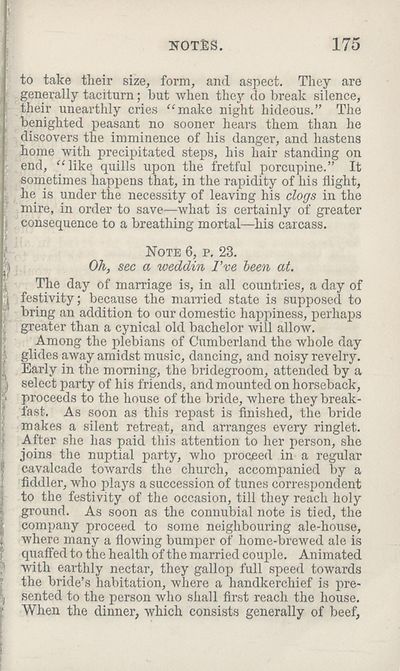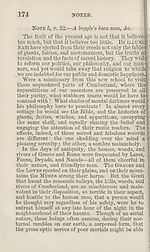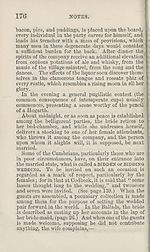Download files
Complete book:
Individual page:
Thumbnail gallery: Grid view | List view

NOTES.
175
to take their size, form, and aspect. They are
generally taciturn; but when they do break silence,
their unearthly cries “make night hideous.” The
benighted peasant no sooner hears them than he
, discovers the imminence of his danger, and hastens
home with precipitated steps, his hair standing on
end, “like quills upon the fretful porcupine.” It
sometimes happens that, in the rapidity of his flight,
he is under the necessity of leaving his clogs in the
mire, in order to save—what is certainly of greater
,J consequence to a breathing mortal—his carcass.
Note 6, p. 23.
Oh, sec a weddin I’ve been at.
The day of marriage is, in all countries, a day of
festivity; because the married state is supposed to
bring an addition to our domestic happiness, perhaps
greater than a cynical old bachelor will allow.
Among the plebians of Cumberland the whole day
glides away amidst music, dancing, and noisy revelry.
Early in the morning, the bridegroom, attended by a
select party of his friends, and mounted on horseback,
proceeds to the house of the bride, where they break¬
fast. As soon as this repast is finished, the bride
makes a silent retreat, and arranges every ringlet.
After she has paid this attention to her person, she
joins the nuptial party, who proceed in a regular
cavalcade towards the church, accompanied by a
fiddler, who plays a succession of tunes correspondent
to the festivity of the occasion, till they reach holy
ground. As soon as the connubial note is tied, the
company proceed to some neighbouring ale-house,
where many a flowing bumper of home-brewed ale is
quaffed to the health of the married couple. Animated
with earthly nectar, they gallop full speed towards
the bride’s habitation, where a handkerchief is pre¬
sented to the person who shall first reach the house.
When the dinner, which consists generally of beef,
175
to take their size, form, and aspect. They are
generally taciturn; but when they do break silence,
their unearthly cries “make night hideous.” The
benighted peasant no sooner hears them than he
, discovers the imminence of his danger, and hastens
home with precipitated steps, his hair standing on
end, “like quills upon the fretful porcupine.” It
sometimes happens that, in the rapidity of his flight,
he is under the necessity of leaving his clogs in the
mire, in order to save—what is certainly of greater
,J consequence to a breathing mortal—his carcass.
Note 6, p. 23.
Oh, sec a weddin I’ve been at.
The day of marriage is, in all countries, a day of
festivity; because the married state is supposed to
bring an addition to our domestic happiness, perhaps
greater than a cynical old bachelor will allow.
Among the plebians of Cumberland the whole day
glides away amidst music, dancing, and noisy revelry.
Early in the morning, the bridegroom, attended by a
select party of his friends, and mounted on horseback,
proceeds to the house of the bride, where they break¬
fast. As soon as this repast is finished, the bride
makes a silent retreat, and arranges every ringlet.
After she has paid this attention to her person, she
joins the nuptial party, who proceed in a regular
cavalcade towards the church, accompanied by a
fiddler, who plays a succession of tunes correspondent
to the festivity of the occasion, till they reach holy
ground. As soon as the connubial note is tied, the
company proceed to some neighbouring ale-house,
where many a flowing bumper of home-brewed ale is
quaffed to the health of the married couple. Animated
with earthly nectar, they gallop full speed towards
the bride’s habitation, where a handkerchief is pre¬
sented to the person who shall first reach the house.
When the dinner, which consists generally of beef,
Set display mode to:
![]() Universal Viewer |
Universal Viewer | ![]() Mirador |
Large image | Transcription
Mirador |
Large image | Transcription
| Antiquarian books of Scotland > Poetry > Ballads in the Cumberland dialect > (179) |
|---|
| Permanent URL | https://digital.nls.uk/125707363 |
|---|
| Description | Thousands of printed books from the Antiquarian Books of Scotland collection which dates from 1641 to the 1980s. The collection consists of 14,800 books which were published in Scotland or have a Scottish connection, e.g. through the author, printer or owner. Subjects covered include sport, education, diseases, adventure, occupations, Jacobites, politics and religion. Among the 29 languages represented are English, Gaelic, Italian, French, Russian and Swedish. |
|---|

